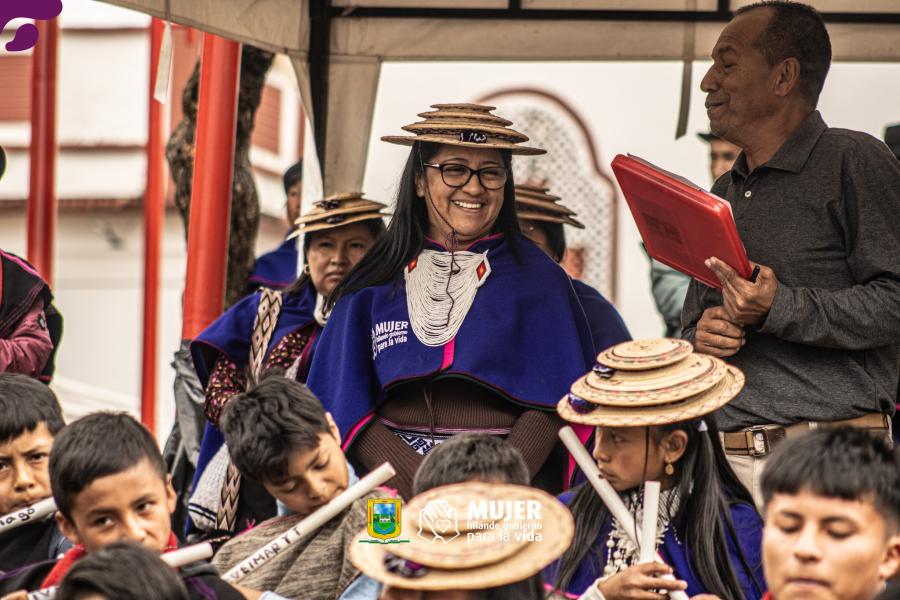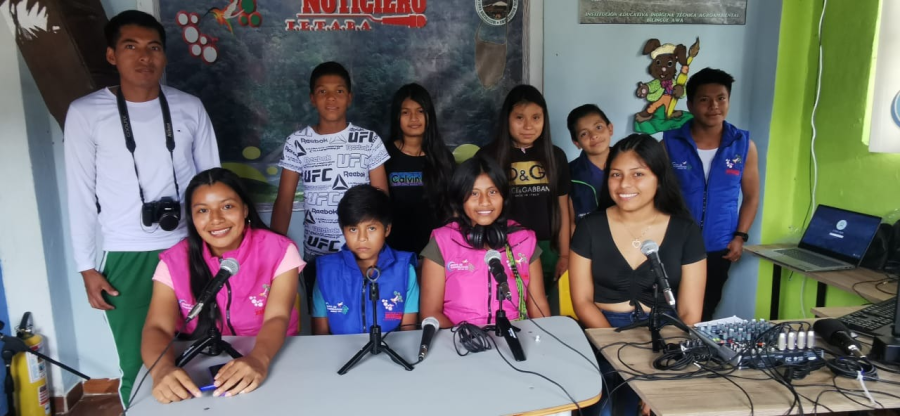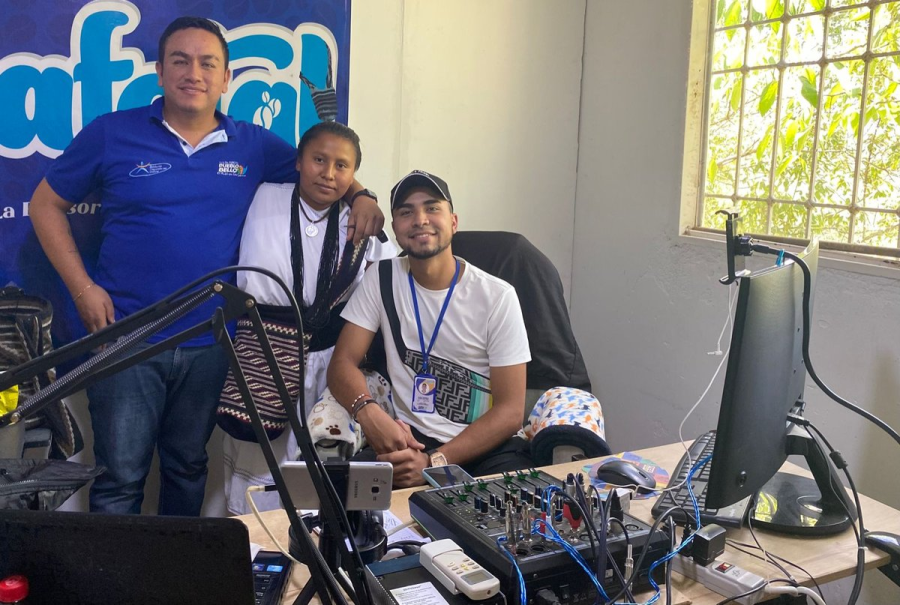"Without the land there is no life...The land provides food, drink, shelter, everything. It continues sustaining us. The earth gives us good understanding and wisdom, intelligence, and a deep history and a good path to follow."
Berito Kubaruwa, President U'wa Traditional Authority
With over 5000 members, the U'wa are an indigenous people that live in northeastern Columbia among the foothills of the Andes. Today, as in the past, the land and its ecological health are fundamental for the continuation of the U'wa's collective well-being. The land remains the context in which the U'wa learn the principles and codes of conduct that constitute their sense of identity, as well as how these principles are practiced. In this way, the U'wa are able to establish an identity that is coherent, sensible, and satisfying to them, and most importantly, of their own making.
How the U'wa recognize themselves is deeply embedded in U'wa culture and places the highest emphasis on showing respect and care for land. This view demands that the land not be abused or neglected through improper or wasteful ways. Members of Cabildo Mayor U'wa or the Traditional U'wa Authority have recently explained that the objective of "all of our daily practices and rituals are [to]...take care of the Earth that was given to us by our eternal Father of the Heavens and the Celestial Mother."
Currently, the U'wa are struggling to prevent what they understand as a potentially disastrous violation of their sacred land-the unfettered development of the area's sub-surface oil reserves. While the U'wa have legal title to a small reserve, they call their entire ancestral land base Resguardo Unico and it is not legally protected. Occidental de Colombia, a subsidiary of Occidental Oil and Gas headquartered in California, was granted prospecting rights in 1992 and the appropriate environmental licenses three years later. Occidental has financial backing from both Colombia's state oil company (Ecopetrol) and Royal Dutch Shell Oil and Gas. They began conducting exploratory drilling and seismic operations in Samoré Block in 1995. This 500,000 plus acre parcel of land in northeastern Colombia overlaps part of the Uwa's Resguardo Unico.
The U'wa laid official claim to much of the land in the Samoré Block in 1993, including some of the land scheduled for development. Soon after the exploratory drilling began, the U'wa started to voice their concerns. They argued that the state's desire to bring new oil reserves into production to offset the future decline in production (and revenues) predicted for the existing Caño Limón field, was in violation of their constitutional rights to social and cultural self-determination, their land, and consultation in projects that potentially will affect their communities. The U'wa knew of the potential hazards associated with this kind of development through first hand knowledge of Caño Limón oil field and its negative social, cultural, environmental, and health effects. Berito Kubaruwa, President of the U'wa Traditional Authority said that "Caño Limón...was my brothers and sisters territory. When they bring the oil above [the earth] it spreads through the air and contaminates the people and animals and damages the land and water. Oxy does not believe us, they believe in having a mountain of money"
In August, 1995, the U'wa petitioned the courts to halt the explorations in the Samoré Block on the grounds that their constitutional rights were being violated. After years in the Colombian judicial system, the Constitutional Court ruled in the U'wa's favor in February, 1997 and ordered the government to reopen the consultation process with the U'wa. However, less than a month later, the Administrative Court overruled this decision, stipulating that Colombia's national interest and the state's right to develop resources superseded the constitutional rights of indigenous people to their land and cultural survival.
The legal path was cleared for Occidental to proceed with their exploration itinerary. However, increasing public awareness and pressure, both in Colombia and abroad, persuaded Occidental and the Colombian government that it would be more prudent to seek reconciliation through negotiation rather than bluntly force the issue. Consequently, after attempting to resolve the issue on their own and failing, the government of Colombia sought external assistance. A joint team from the Organization of American States (OAS) and Harvard University responded to Colombia's request to resolve the issue. In September, 1997 they released their recommendations. Among them; Occidental should immediately withdraw from the area until such time as the U'wa decide otherwise; inflammatory rhetoric should be curtailed by all parties; a consultation process needs to be developed that respects the traditional U'wa leadership and decision making process; and a forum should be created that is dedicated to promoting mutual cultural understanding.
In October, 1997, ONIC (National Indigenous Organization of Colombia), an umbrella indigenous organization working with the U'wa, issued a statement in response to the OAS/Harvard report. They demanded that the Resguardo Unico be recognized and constitutionally guaranteed. In addition, they stated that contrary to public statements by Occidental, the U'wa are acting autonomously and not under pressure by outside political forces. They also expressed support for a number of OAS/Harvard recommendations, including the cessation of oil prospecting in the area, respect for U'wa traditional patterns of authority, and the U'wa right to be the final arbiters in the situation. More recent informal meetings between the U'wa, ONIC, and the OAS/Harvard team have resulted in an exchange of information as to if, and how work may be undertaken outside the Resguardo Unico and if, after full consultation, an agreement can be reached with conditions on development which protect U'wa life, livelihood, and culture. However, Abadio Green Stocel, President of ONIC states, "We have not agreed to negotiate anything with Occidental or Ecopetrol or with the Colombian government."
The U'wa continue to struggle for their land and for their self-determined cultural survival. They argue that the proposed development compromises their claim to have their ancestral lands collectively recognized as the Resguardo Unico. They maintain that their rights to the lands that constitute the Resguardo must be recognized according to constitutional principles and the land be turned over to them. It remains unclear whether the Colombian government is willing to forfeit the oil revenues that U'wa lands would generate for the national coffers. The government may be even more unwilling to allow a social and legal precedent concerning indigenous people and land claims given these untapped resources under disputed lands. It is unclear what will become of the Samoré Block, Resguardo Unico, and the U'wa's self-determination given these seemingly contradictory interests and the high stakes involved. While indigenous people in Colombia have mobilized both national and international resources to resist the transnational corporations' development practices on their land, their situation is still extremely tense and the U'wa have threatened drastic measures if these practices continue.
"We are looking for our own path, with our own words, with our own cultures, with our own traditions...which we've had for many years. We do not want to continue fighting. We want respect as we respect others...All we want is peace."
- Berito Kubaruwa
Article copyright Cultural Survival, Inc.



